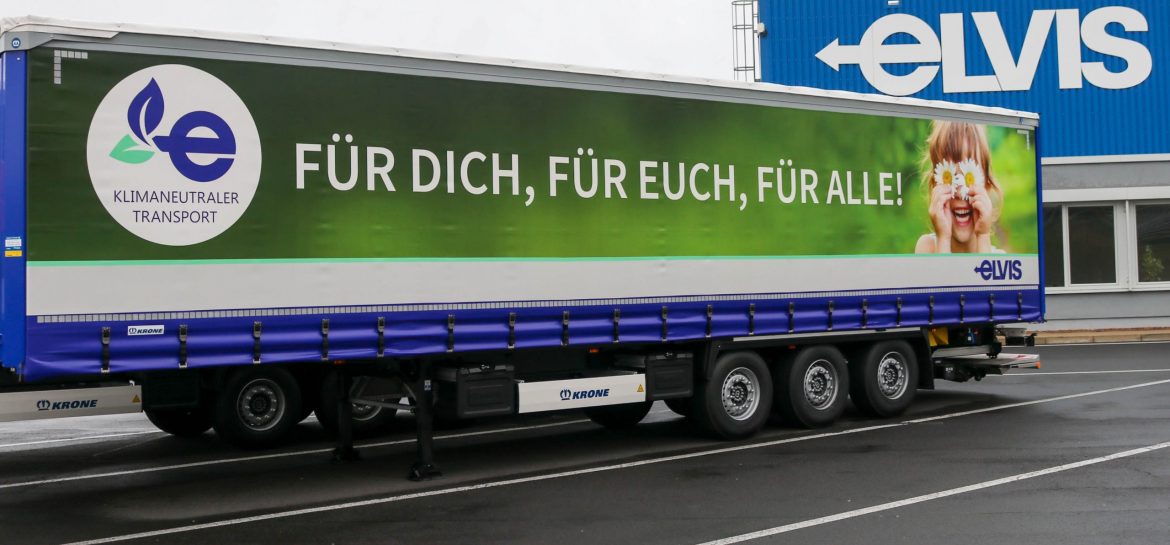Completely climate-neutral: ELVIS offsets CO2 emissions
19 January 2022

• Offset according to recognised Gold Standard
• Already almost 800 tonnes of CO2 offset
• Compensation programme launched for partner companies
Alzenau, 12 January 2022 – The Europäischer Ladungsverbund Internationaler Spediteure AG (ELVIS) and ELVIS Teilladungssystem GmbH can now refer to a balanced CO2 balance. Since it is not yet technically possible to completely avoid carbon dioxide emissions, the two companies have decided to offset them. Since the end of 2019, this has been done according of the recognised Gold Standard. Last year, ELVIS offset almost 800 tonnes of the greenhouse gas in this way by investing in climate protection projects.
“The topic of sustainability is undoubtedly one of the most important of our time. And even if politicians are still divided on the question of how concretely to react to the climate crisis, one thing is certain: there can be no ‘business as usual’,” says Nikolja Grabowski, CEO of ELVIS AG. “You don’t have to be a prophet to foresee that every environmental damage will be priced higher in the future. That’s why we think it is also advisable from a business perspective to act voluntarily today.”
Against this background, the logistics group from Alzenau and the part load system based in Knüllwald have already decided to offset their CO2 emissions in 2019. For the implementation, ELVIS relied on the expertise of the climate protection agency Climate Extender from Gehrden in Lower Saxony. As part of a multi-stage process, the agency first prepared current carbon footprints for both companies and then examined where emissions could be reduced through technical and/or organisational measures.
Measures could be taken to reduce emissions. The amount of compensation was then calculated on the basis of international standards. All unavoidable emissions caused by normal day-to-day business were taken into account, from the employees’ commutes to the operation of the logistics hub in Knüllwald.
ELVIS now offsets these by investing the corresponding amount in recognised environmental protection certificates. These in turn are used to finance climate protection projects in emerging and developing countries that demonstrably bind carbon dioxide or avoid further emissions and thus reduce the burden on the environment. In this way, ELVIS offset almost 800 tonnes of CO2 last year, which is roughly equivalent to the emissions caused by 1,000 fully loaded trucks on the route from Frankfurt to Hamburg.
But Verbund does not want to leave it at that. In addition to the administration in Alzenau and the operation of the hub in Knüllwald, the system transports commissioned by ELVIS itself will also be offset in stages with immediate effect. “Since there is no technology for CO2-free transports yet, offsetting the emissions is currently the only viable way for us,” explains Grabowski.
“We are convinced that the aspect of sustainability is essential for the future viability of a company. However, small and medium-sized companies, especially in our industry, often lack the resources to pay the necessary attention to the issue,” says Grabowski. That is why the association has now taken on this task for its partners. Since recently, the affiliated forwarders and carriers have been able to compensate even individual transports easily and uncomplicatedly directly via ELVIS.
The network calculates the scope and thus the costs of the compensation with reference to the respective consignment weight as well as the permissible total weight of the truck, the vehicle type (trailer/semitrailer truck, solo truck, refrigerated truck), the utilisation of the truck taking into account additional loads, the distance driven and the proportion of empty runs. The offsetting itself is also carried out here through the purchase of certificates from the Swiss Gold Standard Foundation.
Grabowski: “This means that our partners can now approach the shippers with a concept that is clearly defined and transparently calculated. On the one hand, this is good for the environment. On the other hand, it gives our partners a tailwind in the public discussion and strengthens their negotiating position.”